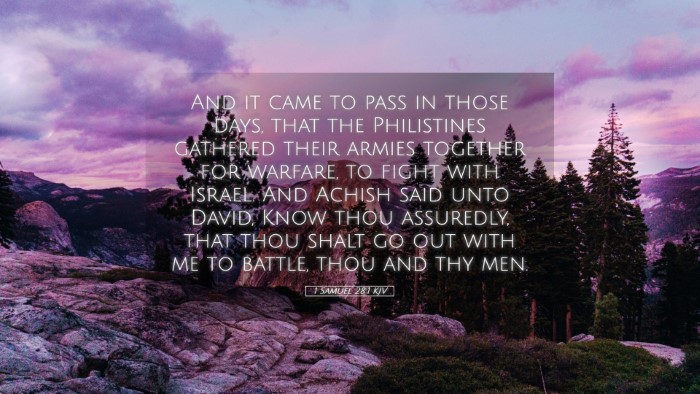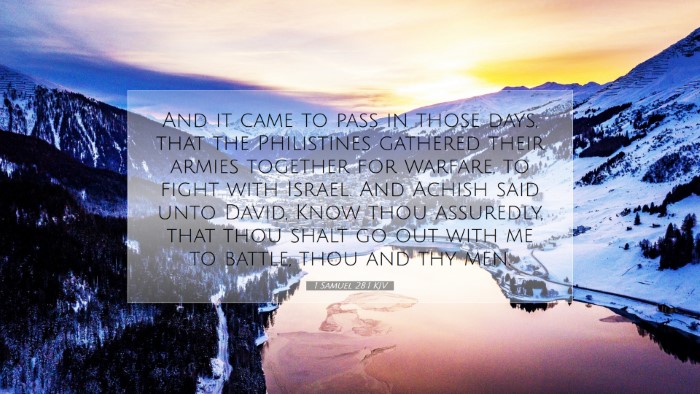Commentary on 1 Samuel 28:1
Text of the Verse: "And it came to pass in those days, that the Philistines gathered their armies together for warfare, to fight with Israel. And Achish said unto David, Know thou assuredly, that thou shalt go out with me to battle, thou and thy men."
Introduction
This verse strikes a critical moment in the narrative of 1 Samuel, reflecting the tense and tumultuous relationships among the Philistines, Israelites, and David. Various public domain commentaries provide a rich tapestry of insights that elucidate the theological and historical implications of this passage. Understanding the context, the characters involved, and the overarching themes offers a deeper spiritual understanding suitable for pastors, students, scholars, and theologians.
Contextual Analysis
1 Samuel 28 occurs during a period of significant transition for Israel, particularly for King Saul and David. The Philistines, persistent enemies of Israel, are gathering their forces, indicating a looming threat that weighs heavily on Israel. Meanwhile, David finds himself in a precarious position, having allied with Achish, the Philistine king of Gath. Here are some commentaries on the surrounding context:
-
Matthew Henry:
Henry notes that the Philistines’ gathering is significant, as it forces David into a moral quandary. Being in alliance with Achish presents ethical implications for David, who is still the anointed king of Israel. This situation illustrates the complexities of God’s sovereignty juxtaposed with human alliances.
-
Albert Barnes:
Barnes emphasizes the political dynamics at play. The Philistines were threatened by Saul’s increasing instability and the potential resurgence of Israelite power under David's future kingship. This tension foreshadows impending conflict not only militarily but also spiritually, as Saul's leadership crumbles.
-
Adam Clarke:
Clarke suggests that David’s presence amongst the Philistines reveals the desperate straits Saul had forced him into. He fled to enemy territory for protection and refuge, which raises the moral dilemmas David faced as a covenant man drawn into an alliance against his own people.
The Character of Achish
Achish, the Philistine king, plays a pivotal role in this narrative. His relationship with David is marked by a juxtaposition of mutual benefit and underlying mistrust.
-
Matthew Henry:
Henry notes that Achish's confidence in David reflects a broader theme of providence. David is presented as a leader who gained reputation among the Philistines, while simultaneously being torn between his heritage and current loyalties.
-
Albert Barnes:
Barnes views Achish as a politically savvy leader who fails to comprehend David's ultimate loyalty to Israel. Achish's assurance in David transitioning into battle with him illustrates the underestimated strength of David’s character and fidelity to God’s chosen people.
-
Adam Clarke:
Clarke highlights that Achish's perception of David as an ally illustrates the complexities of human alliances, particularly when under pressures of war. The loyalty David shows as a fugitive becomes ambiguous in the eyes of his allies and foes alike.
Spiritual Reflections
This passage serves as a narrative pivot with important spiritual and doctrinal implications for contemporary readers:
-
Human Relationships and Alliances:
David's alliance with Achish reminds us of the complexities faced when navigating relationships with those outside our faith community. The tensions of loyalty, integrity, and witness should always be paramount in a believer’s life.
-
Providence Amidst Moral Dilemmas:
The tension in this passage exhibits how divine providence operates within moral ambiguity. God remains sovereign, even as David walks in a way that complicates his identity as the anointed one. The believer’s journey often weaves through difficult choices, yet God can bring purpose from such struggle.
-
The Threat of External Enemies:
The looming threat of the Philistines signifies the spiritual battles that believers face in their lives. The necessity of spiritual vigilance in the face of opposition becomes evident, as does the call to discernment in navigating alliances and tribulations.
Conclusion
1 Samuel 28:1 encapsulates a climactic juncture in Israel’s history and the life of David. Drawing from the insights of Matthew Henry, Albert Barnes, and Adam Clarke, the complexities of this passage reveal profound theological depth concerning leadership, morality, and divine providence. For pastors, students, and theologians, this verse invites reflection on one's own allegiances and the nature of God’s guidance during moments of critical decision-making.


